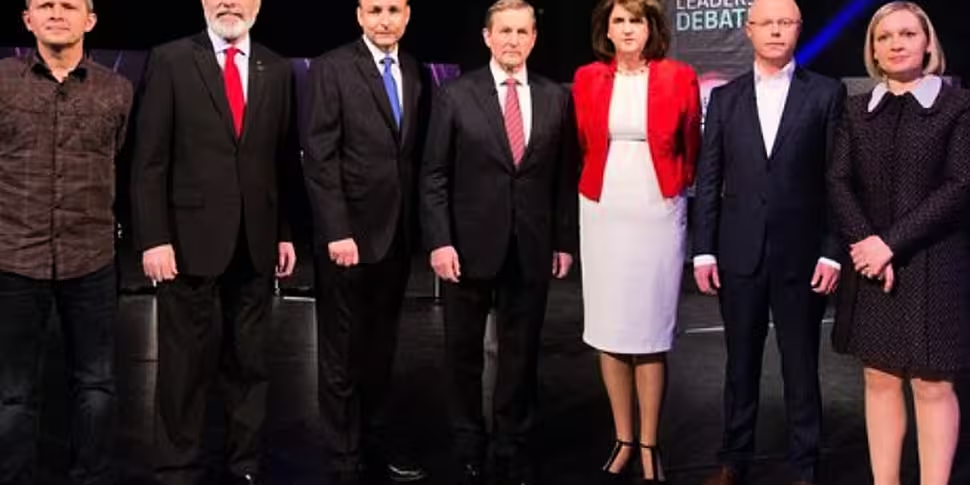Rural recovery, the USC and healthcare were the big issues discussed on the Leaders Debate this evening on RTE.
Overall, despite the fears that having seven party leaders would lead to chaos, the three newcomers actually enhanced the debate. Even if you don’t agree with their message, you would have to say that they delivered it very well.
The strategy signalled was for the Coalition parties to mount a full scale attack on Fianna Fail’s period in Government, was put into action tonight. At times, it seemed like a double act with either Enda or Joan starting a sentence and the other finishing it. Although it was noticeable when Joan asked for Fine Gael to receive Labour second preferences, Enda looked the other way.
Significantly, the question of the 8th Amendment was never introduced although it was brought up by Joan Burton and Richard Boyd-Barrett.
USC
The winner on the USC by some distance was Stephen Donnelly who highlighted a fact which the others wanted to ignore, i.e. that the Fiscal Advisory Council has categorically said that the fiscal space is somewhere in the order of €3.3bn. This of course would mean that the vast majority of the promises from the four main parties could never be implemented.
All but Sinn Fein are prepared to forego up to €4.5bn which would have to be recouped from elsewhere but the question is where? That question was never answered tonight other than a vague, 'we’ll create more jobs therefore we’ll get more tax'. It’s the political equivalent of the chicken and the egg.
Besides this, RENUA are refusing to back away from their 23% flat rate tax which has been questioned by the Revenue Commissioners.
Rural Recovery
Even though they discussed the amount of Gardai later during the Crime question, the issue popped up in relation to Rural Recovery. The reality is that the maximum number of new gards that can come through Templemore every year is 600, according to the Taoiseach. Joan stated it was 700.
This of course doesn’t take into account the retirement and gards leaving due to disillusionment and low morale. The best outcome you could hope for in this scenario would be 300 gards a year. It would take approximately 10 years to get to the figure of 15,000 that’s being promised by Fianna Fail. All of the parties’ figures on gardai recruitment are unrealistic.
But Rural Recovery isn’t just about the number of gards - it’s about broadband and services too. In many ways, one of the major impediments to business development in rural areas is the lack of quality broadband and unless this is resolved, and resolved very quickly, more and more people will leave the West, for either abroad or the large urban areas in the east.
Health
The health discussion this evening centred mainly on the trolley figures yet again. Newstalk's recent Reality Check analysis on the number of people on trolleys, stretching from Dublin to Waterford, was referenced on Twitter by people following last night's debate.
This is what Coalition trolley situation REALLY looks like. #leadersdebate @ElectionNT pic.twitter.com/GKws2WLhqZ
— Social Democrats (@SocDems) February 15, 2016
The reality is at no point since 2006 - including the early years when money was apparently no object - the number people on trolleys never fell below 50,000 in any single year.
Ms Burton stated that it was very simple to have primary care centres to treat people with chronic conditions rather than have them go to hospitals. If it was so simple, how come there were only 47 of those built in five years?
There was only a passing reference to the major issue of disability in this State. Incredibly, 12% of the population have a disability yet it didn’t seem important enough to have a serious discussion about.
Homelessness
Homelessness is primarily a result of the crash when a considerable number of people had to leave their homes as they were unable to repay their mortgages on extraordinarily over-inflated house prices. The housing market is stagnant and the rental market is now, due to a shortage of supply, becoming out of reach to low to middle income earners. Given that less than 100 social houses were built last year, there is nowhere for them to go. However, none of the leaders had an effective answer on how to solve this particular crisis.
Fr Peter McVerry claims that “in the last 12 months, an extra 645 individuals are using emergency homeless accommodation and in the last year, an extra two families a day were becoming homeless, almost all evicted from the private rental sector”. Nobody disputed what Fr McVerry had said on this issue.
Coalition
The final discussion was who the parties would go into coalition with and significantly, Enda Kenny went around the houses and only definitively said he would not go into government with Micheal Martin. The Taoiseach did not say he would not go into government with Fianna Fail.
Micheal Martin on the other hand refused to answer the question on whether he would be Tanaiste in a Fine Gael Government. He says Civil War politics are a thing of the past. Gerry Adams wanted to "send the three amigos to ride off into the sunset".
The three smaller parties effectively would go into government as long as they had their main policies implemented.
Will anyone’s mind be changed?
Or did the debate merely reinforce the views of people of who they support? They all get one more chance next Tuesday but this Election campaign has still to spark into real life.









